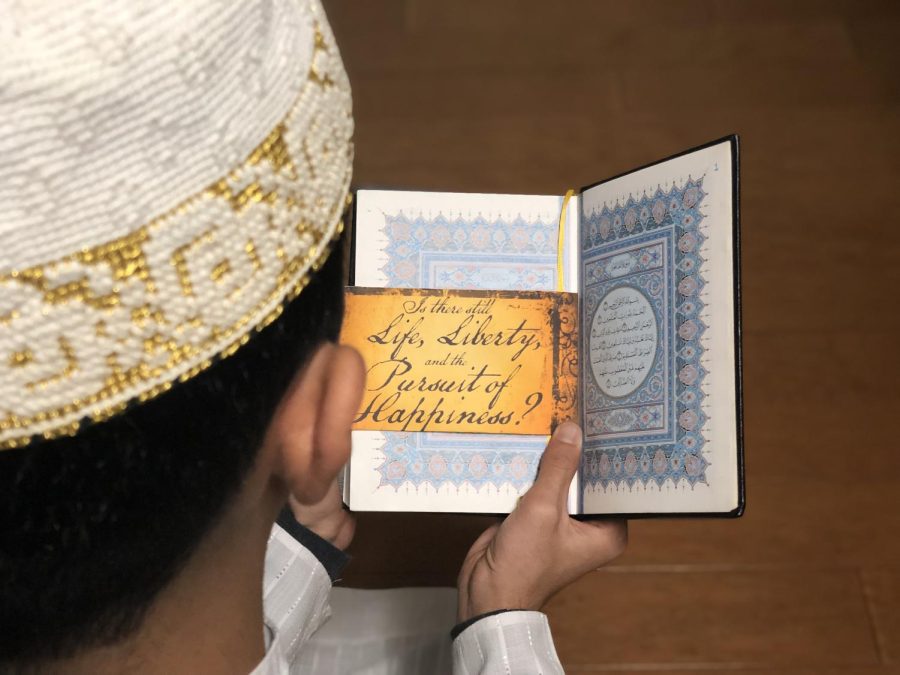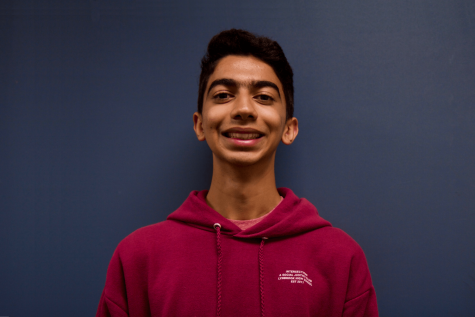I’m Muslim — do I possess the right to life, liberty and the pursuit of happiness?
Photo courtesy of Hatim Saifee
I’m Muslim — do I have the right to life, liberty and the pursuit of happiness?
March 25, 2019
“All terrorists are Muslim, but not all Muslims are terrorists.” It’s not uncommon for me to hear this sentence in public or online. Ten words that encapsulate the views of today’s global population regarding Muslims. Terrorists, “jihadists,” ISIS — all these words have now become synonymous with “Muslim.” Words that make me sick with frustration, frustration that I, a Muslim, have learned to tame.
When I woke up last week to the news of the March 15 shooting at a mosque in Christchurch, New Zealand, I also came across a tweet that showed the Daily Mail’s front page headline addressing the attack — “Angelic boy who grew into an evil far-right killer” — juxtaposed with the Daily Mail’s headline about the June 2016 gay club shooting in Orlando — “ISIS maniac kills 50 in gay club.” That’s when I realized what those 10 words meant. All “terrorists” are Muslim, because to the media, Islam — a religion whose teachings include the word “jihad,” which translates to struggle — is the perfect scapegoat. It’s easy to focus on that specific translation and ignore what the word actually means — a spiritual struggle against one’s sins — since “struggle and war” fits into the narrative that has been created to portray Muslims as troublemakers.
I wasn’t surprised or shocked when I heard of the attack, because I’ve seen it happen before, I’ve seen the vulnerability of praying Muslims taken advantage of: when Muslims were shot in a Quebec City mosque in January 2017, rammed by a van after prayers in London in June 2017, shot near a mosque in Queens in 2016, shot after evening prayers in Zurich in 2016. I wasn’t surprised when I heard an Australian senator’s comments that the Christchurch attack was Muslim immigrants’ fault for settling in New Zealand, and that this shooting was expected. When that senator was egged by a teen for his comments, I saw that egging as a glimmer of hope, a glimmer of intolerance for hatred within our generation. What I was surprised by was my indifference before this attack. The media had succeeded in taming my frustration by being islamophobic in subtle ways for so long, painting all Muslims as terrorists, prompting me to expect such comments and ignore them without a reaction.
The history of how the media portrays terrorist attacks is stained with islamophobia, along with a defense of white terrorists. Never have I once seen the media describe a white perpetrator as a “terrorist” or a Muslim perpetrator as “angelic,” or condemn a white perpetrator to the degree that they condemn Islamist terrorists. But I have seen the media associating the entire religion of Islam with terror. A religion whose purpose is to spread peace and love. A religion whose teachings instill such a sense of community that its followers welcome others with arms wide open, so much so that the first victim who opened the door of the Christchurch mosque greeted the shooter with “salaam bhai” — “hello brother, welcome.”
Let me clarify: I am not, in any way, trying to defend Islamist terrorists; it makes me sick when I hear of any terrorist attack. The point I’m trying to make is that most media portrayal of terrorism is islamophobic, and consequently, so are many people that I come across in public and online. American media in particular does not like labeling white perpetrators as “terrorists,” but rather tries to find humanity in white attackers. In doing so, the media virtually diminishes the danger that white nationalism poses in perpetrators like the Christchurch attacker, the Las Vegas shooter, the Quebec attacker. It tends to focus on the mental instability and attribute the mass shootings to mental illness instead of violent motives.
The reason why the media refuses to label white attackers as “terrorists,” time and time again, is clear: if the media condemns white attackers the exact same way they target colored attackers, then they would be dishonoring their own white, “truly American” culture. They would offend the white nationalist sentiment of white values being superior to all the rest. And this could pose serious and dangerous backlash. But it’s easy to condemn colored terrorists because they’re the “others,” they belong to an inferior culture, their values and the teachings from the Quran brainwash them to commit evil and violent actions.
If the media, which holds so much power that it’s often referred to as the “fourth pillar of democracy,” fails to highlight the threat from white attackers, if the media fails to do its job — which is to condemn terrorists regardless of race or religion — then how can we expect any change in legislation? How can we expect the government, which in our country prioritizes the profits of gun manufacturers over its own citizens’ lives, to follow the New Zealand prime minister’s urgency in calling for firearm regulations? How can we expect the government to be free of islamophobia when this same islamophobia has infested the media and subsequently the public?
As a Muslim American, I can’t continue being silent, despite how uncomfortable and scared I feel writing this column. I can’t continue to ignore the rise of white nationalism — a spreading global sentiment which invalidates my right to equality, a sentiment that Trump does not view as a rising threat after this shooting.
Condolences won’t suffice. Thoughts and prayers to the victims of hate crimes won’t suffice. We need to take action. We need gun control and regulations. We need to eradicate islamophobia. Muslims, immigrants, minorities — we all are here to live better and safer lives — but in a society that promotes islamophobia and white nationalism, we will always remain targets and victims, and never be able to believe in our right to life, liberty and the pursuit of happiness.






























































Irfan Ahmed • Jun 26, 2019 at 7:50 am
Dear Hatim, Assalam alaikum. I have read it earlier but today when your father posted it on the group, I have read it again. Wonderful crystal clear thought and so real. Please keep it up and keep writing. May Allah take you to the greater heights in the life. Aameen
Zainab Haideri • Mar 25, 2019 at 8:09 pm
Very well portrayed….Hatim.
PL write about the origin of terrorism …… especially the birth of Islamic terrorist or Muslim terrorist…… because most questions will be answered by knowing the history.